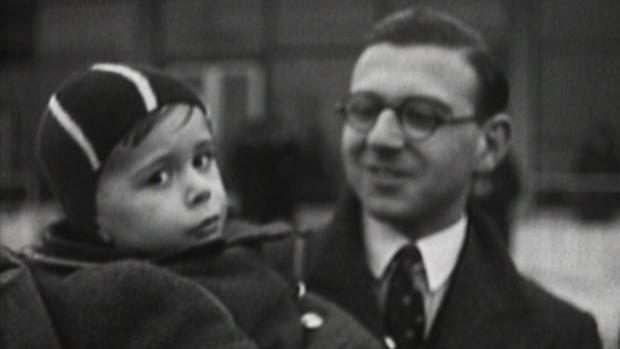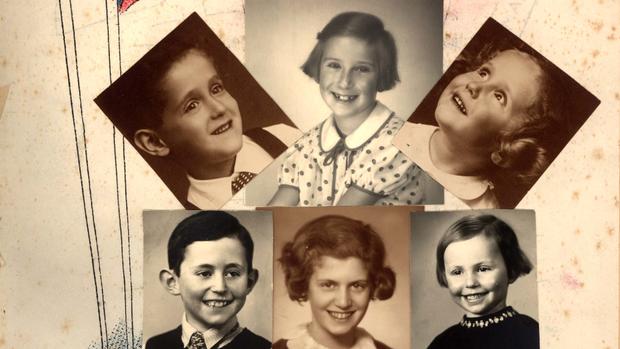Proof that one person can make a difference
I first learned about Sir Nicholas Winton a couple of years ago. I was waiting for a movie to begin when a friend asked if I had ever heard of a London stockbroker who had managed to rescue 669 children from almost certain death on the eve of World War II. I hadn't, but wanted to know more. When my friend told me he was still alive, alert and living in Britain, I was pretty sure this was the beginning of a great 60 Minutes story.
I called correspondent Bob Simon and executive producer Jeff Fager, gave them the basic outline of Winton's unbelievable achievement and asked them the following question: If they had the chance to interview Oskar Schindler or Raoul Wallenberg, both of whom famously saved thousands of Jews' lives during the war, would they? The answer was yes.
Winton's story would take us to Prague, London and Jerusalem, and introduce us to Holocaust survivors who owe their lives to Winton but who, for most of their lives, had no idea who had saved them.
We interviewed Winton at his home in Maidenhead, England, where he had lived alone since his wife passed away in 1999. He graciously welcomed us, but I am pretty sure he was overwhelmed by the amount of video equipment we had with us and was wondering what he had got himself into. Winton also seemed somewhat bemused that we wanted to hear his story.
As for us, we were a bit apprehensive about interviewing someone Winton's age. We'd never interviewed someone so old, but as soon as the cameras rolled and Bob asked his first question, whatever fears we had were laid to rest. Winton was lucid and sharp -- his memory intact. He was also charming, funny and more than a little irreverent.
Winton's story begins in 1938 in London, where he was a 29-year-old stockbroker enjoying the good life. The son of German-Jewish immigrants, he had been following the rise of Hitler and the Nazis and knew they were on the march. He was convinced war was imminent. Hitler's troops had just marched into Czechoslovakia and occupied the region known as the Sudetenland, creating the war's first refugee crisis. At least 150,000 people had fled to makeshift refugee camps that sprang up around Prague. The conditions they faced were dire.
When a friend suggested that Winton cancel his annual ski trip and join him in Prague to see what was going on, Winton decided to use his vacation days and go. The situation he encountered was desperate. Efforts by organizations trying to help refugees were hampered by the fact that most countries in Europe weren't willing to take them in. Winton also told us he wrote to President Roosevelt asking the U.S. to receive them, to no avail.
Parents were frantically trying to get their children out, so Winton decided to focus his efforts on helping those children. He had no background or experience in dealing with refugees, but was about to take on the Nazis and the British bureaucracy in a remarkable feat of skill, determination and cunning. During the few days he was in Prague, Winton laid the groundwork for an organization to transport children to Britain on trains. He identified people willing to help, met with parents determined to get their children out, and started making lists of children whose parents wanted them to go.
When he returned to London, he set up a fake organization, appointed himself chairman, put his mother to work running a small office, and began negotiations with the British government for permission to bring unaccompanied minors into England. Meanwhile, he looked for families to take them in. He raised money, paid bribes, procured transit papers and, when necessary, forged documents. When Bob Simon asked him about all of that he was unapologetic -- saying simply, "It worked."
Everything finally came together on March 14, 1939, when the first train carrying 20 children left Prague. Neither the children nor their parents knew this was likely the last time they would ever see each other. Six more trains left between March and August 1939.
An eighth train, carrying 250 children, was scheduled to leave on September 1, 1939, but that was the day Germany bombed Warsaw, beginning the Second World War. Borders were closed and transportation halted. The eighth train never left. No one knows for sure what happened to the 250 children who were already in their seats that day. They and their families are presumed to have died in the Holocaust.
The war ended Winton's efforts to save children. His organization shut down operations and he moved on with his life. He made no attempt to contact the children he had saved. They had been dispersed all over Britain, so he got on with his life. During the war, he served in the Red Cross and the Royal Air Force. Following the war, he worked repatriating assets seized by the Nazis, went back to his career in finance, got married and raised a family.
Rarely did he ever talk about his efforts to save children. When Bob asked him why, Winton said he wasn't trying to keep it a secret - he just never talked about it. Maybe it's because the Holocaust had claimed all the children he hadn't gotten out or maybe it's because Winton really didn't believe he had done anything out of the ordinary.
At the beginning of our interview he told us that he's always felt that, "If something's not impossible, there must be a way of doing it." Nicholas Winton found a way to do it in Prague and made it work. Because of him, 669 children were spared and able to have families of their own. Today, some 6,000 people are alive who wouldn't be if it weren't for Nicholas Winton.
Fifty years after the war, Winton's remarkable story finally came out in a London newspaper and on the BBC. The "children" from 1939 found out who had saved them and have been celebrating Winton ever since. So has the Czech Republic and England, where Nicholas Winton became Sir Nicholas Winton after being knighted by the Queen. The original children from 1939 and their descendants all call themselves "Nick's family."
The man we met was an original. A modest man who never tried to exploit or exaggerate his achievements or to cash in on them. A man who I believe set an example for all of us. A man who proves again that one person can make a difference.

